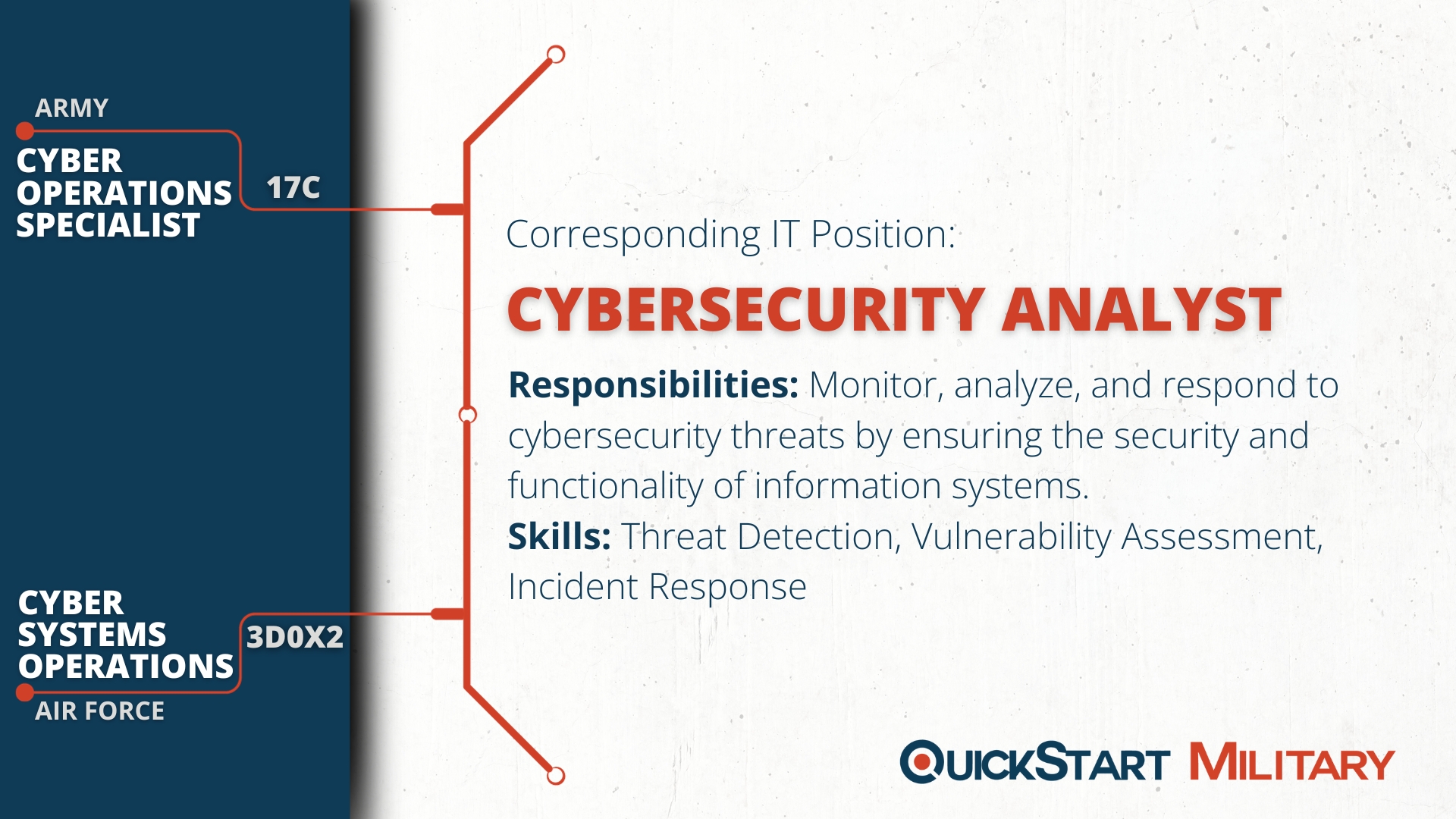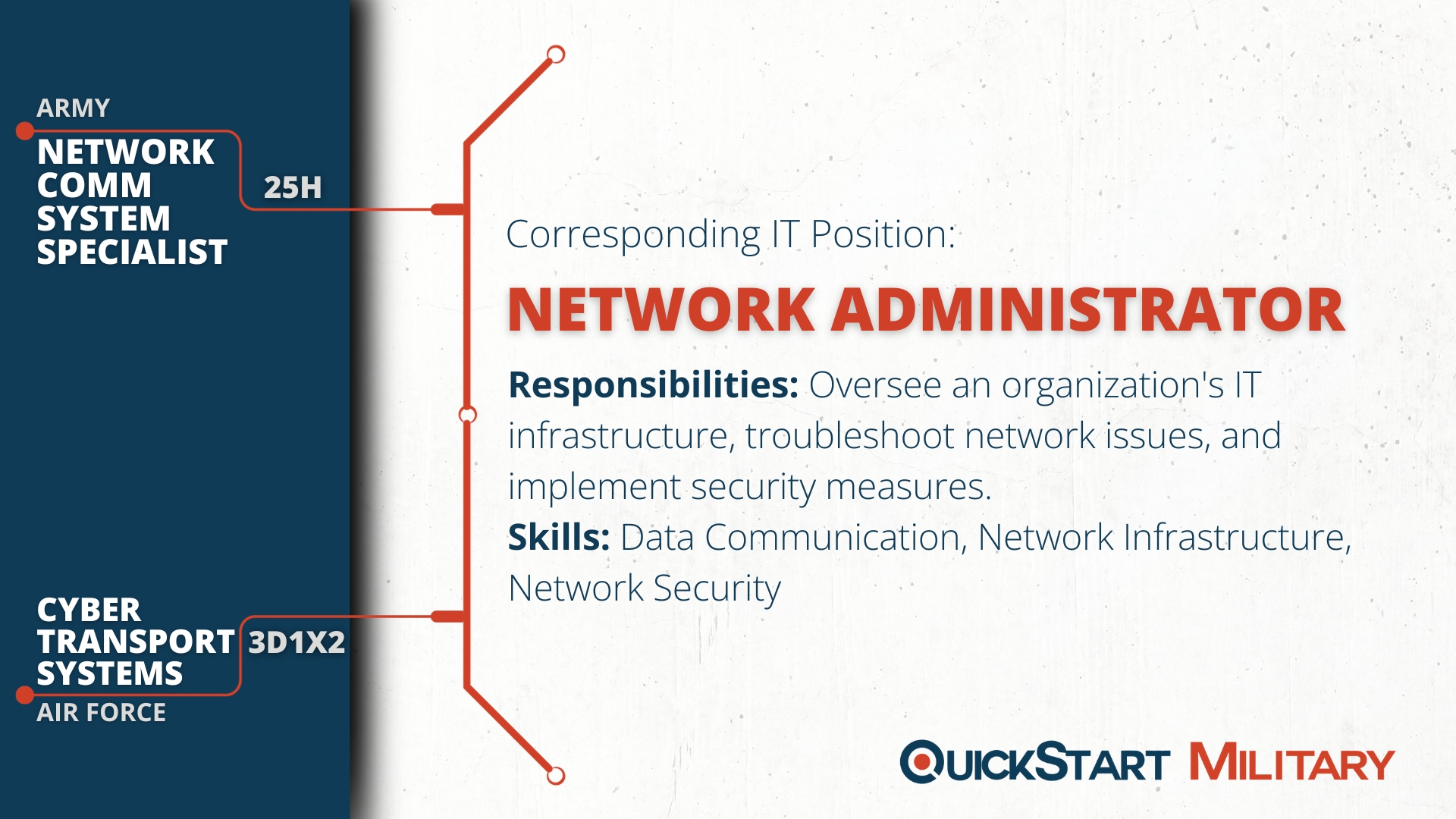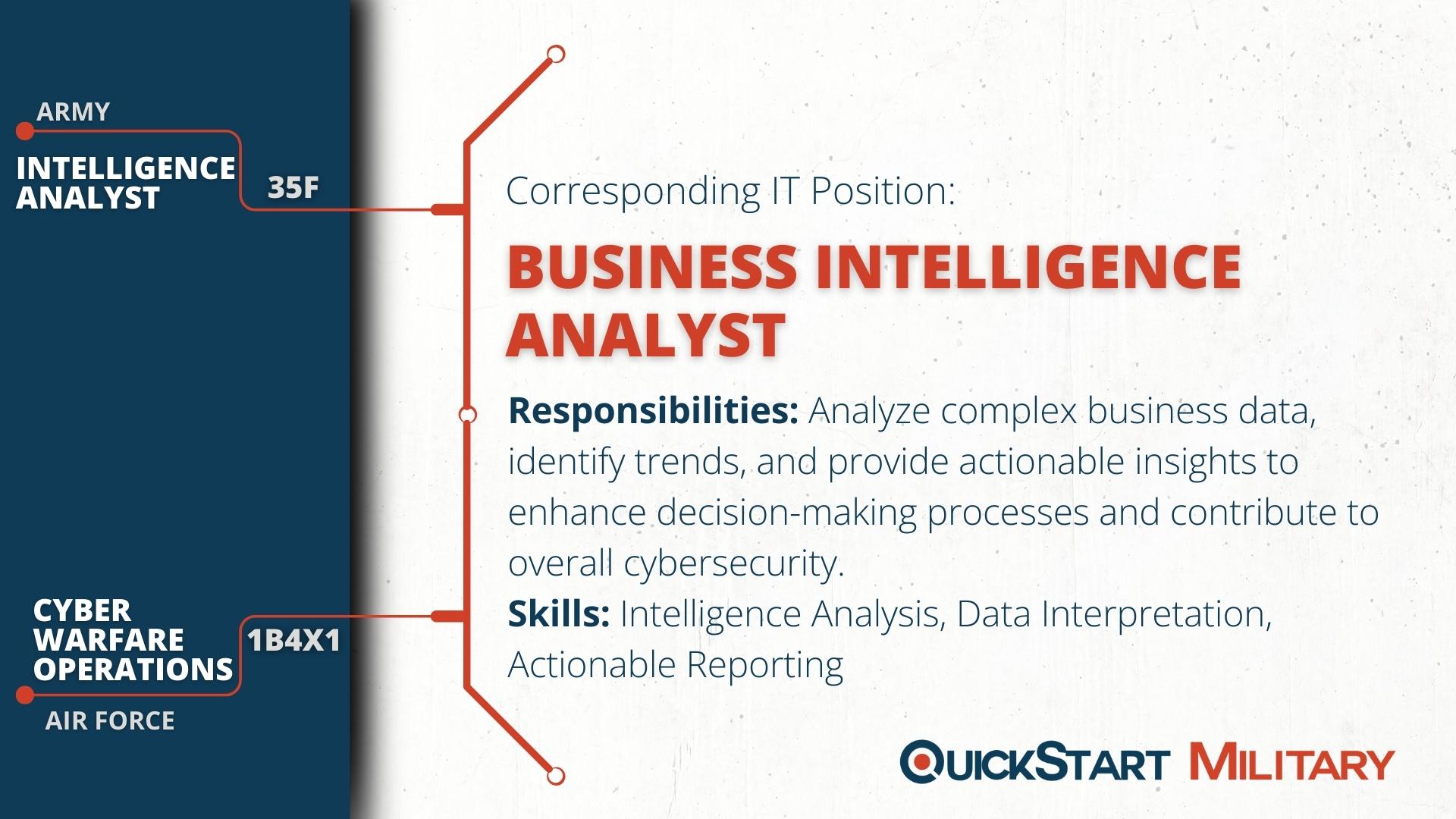
How to Leverage Your Military Experience to Stand Out in the IT Job Market
The IT job market — where innovation is the currency and adaptability is the key — there exists a unique group of individuals primed for success — those who have served in the military.
Beyond the camouflage and combat boots lies a rich reservoir of skills and qualities that seamlessly transition into the world of IT. Discipline, leadership, problem-solving, and adaptability are not just buzzwords; they are the cornerstones of military training.
In this article, we'll explore how your military experience can be a formidable asset in the IT job market. From the front lines to the server rooms, the qualities instilled during military service align seamlessly with the demands of the tech industry.
By translating these skills and effectively communicating your experiences, you as an individual with military experience, can emerge strong in the fast-paced and tech-driven world of IT.
If you have questions about how to get started in IT training, feel free to contact one of our QuickStart Military experts to learn how to leverage your unique background and make your mark in the IT landscape.
Turning Your Military Experience Into an IT Career
Transitioning from a military setting to the tech industry may seem like navigating uncharted territory, but the skills you’ve gained from your military experience are the compass guiding you through this transformation.
Because whether you realize it or not, you have already cultivated transferable skills through your service that hold tremendous value in the IT job market.
And it's not merely about recognizing the value of your skills; it's about strategically identifying and showcasing your strengths in a language that resonates with the tech industry.
For instance, cybersecurity vigilance, honed through the relentless commitment to safeguarding sensitive information, finds a natural home in roles like network security within the tech sector.
The ability to operate seamlessly within a team — a cornerstone of military success — plays a significant role in collaborative environments, such as IT consulting projects. Moreover, the unwavering attention to detail required in military operations finds resonance in the meticulous realm of project management.
Here are some key skills and attributes you may have gained through your military service that would also be beneficial in the IT space:
- Leadership and Teamwork: Military service trains leadership and teamwork abilities, which is essential for overall IT project management and collaborative development efforts. As you transition into your IT role, make sure to showcase instances where you led teams or contributed significantly to group achievements when talking to future employers (see the following section).
- Problem-Solving and Adaptability: Military personnel excel in problem-solving amidst high-pressure situations. This adaptability translates well into troubleshooting IT issues and finding innovative solutions, a fundamental aspect of various IT roles.
- Attention to Detail and Cybersecurity Awareness: Military training emphasizes attention to detail, a critical trait in many IT roles, such as cybersecurity, where identifying vulnerabilities and ensuring system integrity are paramount. If you are interested in a cybersecurity role, be sure to highlight your keen eye for detail and commitment to appropriate protocols.
Once you understand where your skill sets lie, receiving the proper industry-recognized certifications can be your passport to credibility and success. Certifications such as CompTIA Security+, Cisco Certified Network Associate (CCNA), and Certified Information Systems Security Professional (CISSP) are not only highly respected but also directly validate the skills cultivated during your military service.
You can receive IT training for these certifications from military-specific programs as a launching pad for your civilian IT career. By leveraging these military training programs, such as those offered by QuickStart Military, you not only gain technical expertise but also solidify your military background with the dynamic landscape of IT.
Examples of Military Roles that Directly Correlate With IT positions



Strategies to Effectively Communicate Military Experience for an IT Role
With a newfound understanding of how your military skills align with the intricacies of the IT job market, it's crucial to now focus on effectively communicating these assets to potential employers.
In the following section, we'll unravel essential strategies to articulate your military experience in a way that resonates with IT recruiters. From crafting a compelling resume that highlights your technical proficiency to acing interviews by drawing parallels between military achievements and IT challenges, we'll guide you through the art of constructing your unique background into a compelling narrative that positions you as the ideal candidate for the tech roles you aspire to secure.
1. Translate Military Jargon
One of the primary challenges when transitioning from military service to the civilian IT sector lies in translating the unique terminology and acronyms ingrained in military culture. Your resume and cover letter serve as the first point of contact with potential employers, making it imperative to connect this linguistic gap.
Begin by dissecting your military roles, responsibilities, and accomplishments, distilling them into clear and concise descriptions. Then, in crafting your resume and cover letter, strategically integrate keywords and phrases commonly found in IT job descriptions. Emphasize your experience with relevant technologies, software, and tools and highlight instances where your problem-solving skills were instrumental.
Next, clearly articulate the relationship between your military experiences and the skills demanded in the IT role you're pursuing while using concrete examples to showcase how your leadership, teamwork, and problem-solving abilities in the military directly correlate with the demands of the IT industry.
For instance, if your military role involves managing and securing classified information, frame it in terms of cybersecurity and information security protocols. Instead of using military-specific acronyms, spell out the technical aspects of your responsibilities in a manner understandable to those outside the military sphere. This not only ensures clarity but also demonstrates your ability to communicate complex concepts—a valuable skill in any IT role.
Here are examples of translating such jargon for an IT resume and how to expand on your experience in a cover letter:
Original Military Description - "As a Systems Administrator, I oversaw the maintenance of C4ISR systems, ensuring optimal functionality of communication and intelligence systems in a tactical environment."
Translated for IT Resume - "As a Systems Administrator, I was responsible for maintaining and optimizing Command, Control, Communications, Computers, Intelligence, Surveillance, and Reconnaissance (C4ISR) systems. This involved ensuring the seamless functionality of communication and intelligence systems in dynamic operational environments."
Original Military Description - "As a Communications Officer, I managed the deployment and maintenance of secure communication networks, ensuring reliable and encrypted data transmission in a high-stakes operational environment."
Translated for IT Cover Letter - "In my role as a Communications Officer, I spearheaded the deployment and upkeep of secure communication networks utilizing advanced encryption protocols. This experience equipped me with hands-on proficiency in safeguarding data integrity and confidentiality—an essential skill set for roles in IT security and network management."
By translating your military narrative into a language that resonates with civilian employers, you not only enhance your chances of making a compelling first impression but also demonstrate your adaptability.
2. Quantify Achievements
Quantifying your achievements adds a layer of specificity to your resume and emphasizes the tangible impact you've made.
Let's consider examples in the context of a military professional seeking an IT role in cybersecurity:
Original Military Achievement - "As a Cyber Operations Specialist, I improved the efficiency of network monitoring."
Quantified for IT Resume - "As a Cyber Operations Specialist, I enhanced network monitoring efficiency by implementing automated processes, resulting in a 20% reduction in response time to potential cybersecurity threats. This not only fortified the security posture but also demonstrated my commitment to optimizing operational outcomes through technological enhancements."
Original Military Achievement - "Led a team in implementing new software solutions for intelligence analysis."
Quantified for IT Resume - "Spearheaded the implementation of cutting-edge software solutions for intelligence analysis, resulting in a 30% increase in data processing speed. This transformative initiative not only elevated the team's capabilities but also showcased my leadership in driving technological advancements for improved efficiency."
By incorporating quantifiable metrics, you provide concrete evidence of your achievements, making your impact more tangible for prospective employers. Whether it's improving efficiency or reducing response times, quantifying your achievements reinforces the value you bring to the table and aligns your military experience with the measurable outcomes expected in the IT sector.
3. Tell Compelling Stories
Finally, sharing anecdotes from your military experience can provide powerful illustrations of your practical abilities in an IT context.
Let's consider a scenario where a military professional faced a challenging situation as an Intelligence Analyst and how this experience can be effectively communicated for an IT role:
Original Military Anecdote - "As an Intelligence Analyst, I led a team in deciphering encrypted communications, uncovering crucial information that played a pivotal role in mission success."
Translated for IT Interview - "In a high-pressure scenario as an Intelligence Analyst, my team and I encountered encrypted communications that posed a significant obstacle. Leveraging my problem-solving skills, we devised innovative decryption methods, ultimately extracting vital information that directly contributed to mission success. This experience not only highlights my ability to navigate complex challenges but also underscores my commitment to delivering results under pressure, qualities crucial in IT roles requiring analytical thinking and creative problem-solving."
Original Military Anecdote - "During a mission, I implemented a real-time data analysis system, providing actionable intelligence to field commanders and enhancing the decision-making process."
Translated for IT Interview - "In a mission-critical situation, I recognized the need for real-time data analysis to support decision-making. Taking the initiative, I implemented a system that facilitated instant data processing, offering actionable intelligence to field commanders. This experience exemplifies my capacity to identify technological solutions that directly impact operational outcomes—an ability transferrable to IT roles demanding innovation and strategic thinking."
By sharing specific anecdotes that showcase your problem-solving abilities, leadership skills, and capacity for innovation, you create a narrative that captivates employers. These stories not only provide concrete examples of your practical skills but also demonstrate the direct relevance of your military experience to the IT challenges you’ll encounter.
Stand Out In Your IT Role
The transformative journey from military service to a thriving IT career is marked by resilience, adaptability, and a wealth of invaluable skills. As military personnel are able to harness their leadership, problem-solving, and cybersecurity acumen, they not only stand out in the IT job market but also enrich the industry with their unique perspectives.
By understanding how to translate these qualities into the language of IT, leveraging specialized military training programs, acquiring relevant certifications, and effectively communicating your experiences, you can position yourself not just as a candidate but as a powerful asset.
Remember to quantify your achievements, providing tangible evidence of your impact. The anecdotes of overcoming challenges, leading teams, and implementing innovative solutions serve as testaments to your practical abilities.
At QuickStart Military Programs, we want to help you build the bridge between your military expertise and IT excellence. With the fusion of your military discipline and the advancements of IT innovation, we can help you carve the path to IT career success, showcasing that the skills you earned in service to the nation speak volumes about your effectiveness in navigating the complexities of both military and IT landscapes.
When you are ready, speak to an expert today!
